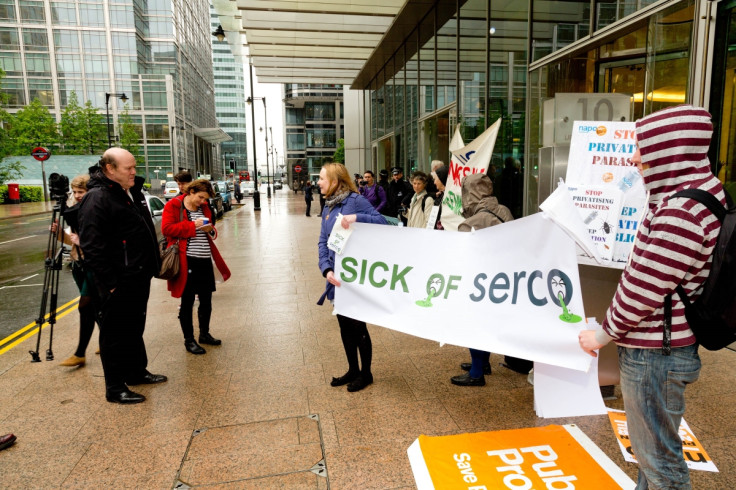Why We're Sick of Serco

Today I met with Rupert Soames, Serco's new chief executive, outside the building in Canary Wharf where his company was holding its AGM. While he didn't stop to talk for long, he listened politely as I suggested companies like his should be transparent and accountable to the public when they're taking public money to run public services.
We Own It launched last year to be a voice for public service users and for public ownership. Today we stopped being 'for' for a while and took a closer look at what we're against. We decided to protest outside Serco's AGM, at an event we called 'Sick of Serco', with sick bags at the ready to show how we – and a majority of the public – feel about this outsourcing company.
Soames is the grandson of Winston Churchill, and he has been set the tricky task of mending Serco's battered reputation. He'll have a tough job ahead of him. People are well and truly sick of Serco. Not just because Serco is under criminal investigation by the Serious Fraud Office for defrauding the taxpayer. Not just because Serco has been accused of all number of scandalous things – from allegations of abuse and deaths at detention centres to lying on NHS records.
Soames will have trouble because the public doesn't believe that Serco should be running public services at all. Of course, the public doesn't get a say so maybe that doesn't matter. We think it does. Our polling, carried out by Survation, about what the public thinks of outsourcing companies shows people are deeply uncomfortable with Serco. They use words like 'self-interested', 'greedy' and 'unaccountable' to describe the company. Governments and businesses ignore those kinds of reactions at their peril.
Of course, people aren't just sick of Serco. They're sick of G4S, they're sick of Atos and they're sick of Capita. And it's not just that the scandals that are the problem. There is a fundamental contradiction between what these firms are set up to do, and what we want them to do.
This contradiction is revealed very clearly in our polling. 69% of the public think that maximising profit is an important motivator for Atos, Capita, G4S, Serco while 38% think it should be important. 22% think that providing the best service to the public is an important motivator, while 80% think that it should be important.
This handful of firms running our public services have very little competition, and every incentive to squeeze profit from taxpayers and public service users alike.
Our polling found that outsourcing companies like Serco, Atos, Capita and G4S have the lowest levels of trust compared to other organisations like central government, the civil service, the NHS and the police service, with 64% distrusting them and 21% trusting them. Question after question reveals that people don't feel comfortable with services being in their hands.
So what do we do about it? Firstly, we need to stop the censorship of the very idea of public ownership in policy-making circles – it's time to start talking about it. Our report 'Better in Public Hands' has examples of public ownership working well both in the UK and across the world. It talks, for example, about local authorities taking services in-house to improve value for money and East Coast rail working well in public hands.
Public ownership is a broad term that doesn't have to mean one size fits all. Sometimes the best solution may be local, sometimes regional or national. Sometimes the public sector is best placed to provide a service, sometimes alternatives should be looked at from cooperatives, social enterprises and charities. Will this create perfect public services? Of course not, but organisations like these, and the public sector, are better placed to put the people who use services first, than organisations like Serco.
Secondly, we have to introduce a Public Service Users Bill, to promote transparency, accountability and services that work for us. We should be able to access information and data about companies like Serco, look at the contracts we've agreed with them and recall them when they do a bad job. Government, meanwhile, should make sure that they always look at the public ownership option first and put forward an in-house bid if they do contract out. And they should be required to show how contracts maximise social value.
Ultimately, Rupert Soames has to put his shareholders first. That's his job. But we're thoroughly sick of the government doing it for him.
Cat Hobbs is a director of the We Own It campaign.
© Copyright IBTimes 2024. All rights reserved.






